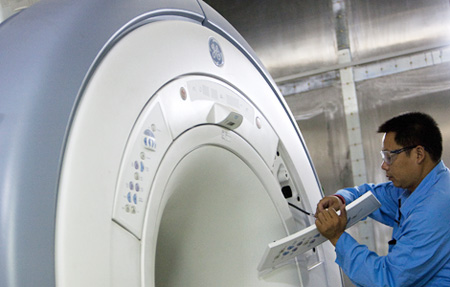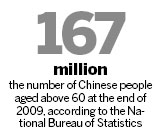GE moving X-ray unit to Beijing
Updated: 2011-07-26 09:57
By Li Woke (China Daily)
|
|||||||||||
|
 |
|
A General Electric Co employee at the healthcare unit's production facility in Beijing assembles a medical magnetic resonance imaging (MRI) device. [Photo / Agencies] |

BEIJING - General Electric Co's healthcare sector will move its X-ray global headquarters to Beijing from the United States, demonstrating the company's interest in the fast-growing Chinese healthcare market.
The headquarters will move from Waukesha, Wisconsin. The relocation will mean a move for a handful of managers.
The division will hire about 200 engineers, and more than 20 percent of the X-ray unit's new products will be developed in China, the company said on Monday in Beijing.
Moving the headquarters to China "will help make the business more nimble and responsive while continuing to strengthen our local focus and grow our global footprint", said Anne LeGrand, vice-president and general manager of X-ray for GE Healthcare, the world's biggest maker of medical-imaging machines.
The Chinese healthcare market is promising. Data from the National Bureau of Statistics show that the country had nearly 167 million people aged above 60 as of the end of 2009, or some 12.5 percent of its total population.
"By the end of 2020, China is estimated to have 248 million seniors above 60 years old, who will account for 17.2 percent of its population," said Yan Qingchun, vice-president of the China National Committee on Aging.
"By the end of 2100 the number of China's elderly will surge to 318 million, more than 31 percent of the country's population," Yan said.
To meet rising medical care demand, the State Council, or cabinet, approved a long-awaited medical reform plan. The plan would mean spending 850 billion yuan ($123 billion) by 2011 to provide universal medical care to the country's 1.3 billion people.
According to the reform plan, authorities would take measures within three years to provide basic medical security to residents, improve the quality of medical services and make medical care more accessible and affordable.
"By moving strategic leadership to a new global hub of healthcare innovation, GE X-ray is better positioned to understand and meet the needs of high-growth markets, support the Chinese government's Primary Care Initiative and the 12th Five-Year Plan (2011-2015)," said Rachel Duan, president and CEO of GE Healthcare China.
Last spring, the Chinese government announced the 12th Five-Year Plan, which has healthcare reform as a major theme.
"We anticipate it's going to be a growing modality," LeGrand said, adding her division should have "double-digit" growth rates as the country converts from film and analog to digital X-ray technology.
"When you look at a market like China, it is primarily analog. So we feel this will also bring digital technology to an appropriate price point."